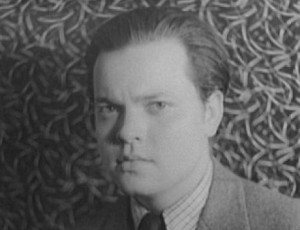Since Orson Welles' death in 1985, the impression he left on American cinematic aesthetic has become a canyon. We have an opportunity to look back on his life as we come to the centenary of his birth on May 6.
Roger Ebert summarized Welles' life using one of Welles' own quotes, spoken to a sparse crowd in a theater:
"My name is Orson Welles. I am an actor. I am a writer. I am a producer. I am a director. I am a magician. I appear onstage and on the radio. Why are there so many of me and so few of you?"
Welles was considered a prodigy. The success of his 20s came to color all of his other ambitions. He was famous for radio and stage, voicing a radio noir show, The Shadow, and creating real panic through a realistic news broadcast-style telling of War of the Worlds, but it is his cinematic debut—yes, debut, his first film—that has made his legend. In 1941, at 25, Welles released Citizen Kane.
Citizen Kane is a wholly American story of a young boy who inherits a fortune and becomes a newspaper mogul, losing his innocence and idealism throughout. The film is told through flashbacks of his ex-friends and lovers, as a journalist questions them to discover the meaning behind Kane's enigmatic last word, "rosebud." Welles co-wrote, starred in and produced the movie.
Although many of his films continue to be studied, and praised for their innovation in camerawork and acting and writing, it is Citizen Kane that sits atop the American Film Institute's list of greatest American films of all time.
Welles never quite fulfilled his potential. Perhaps it was peaking too soon, or perhaps being too ambitious, but his films were much less acclaimed during his lifetime.
We can talk all day about his influence on American cinema of the 1960s and 1970s, and his influence today, but I think many have said it better, so try out some of these.
Walking Shadows: A look at the battle between a young, fearless Welles and William Randolph Hearst, whose life was the inspiration for Citizen Kane.
My Lunches With Orson: A collection of chats with the man himself.
Mr. Arkadin: Welles is also an author; this book is about a man assigned to find the history of another man who cannot remember who he was.
Reconstructing American Historical Cinema: A book for the film buffs.
Orson Welles's F for Fake: And finally, one of the elder Welles' more avant-garde films.
And stay tuned for the documentary The Magician: The Astonishing Life and Work of Orson Welles, which will be released later this spring.




Add a comment to: Orson Welles: 100 Years Since His Birth